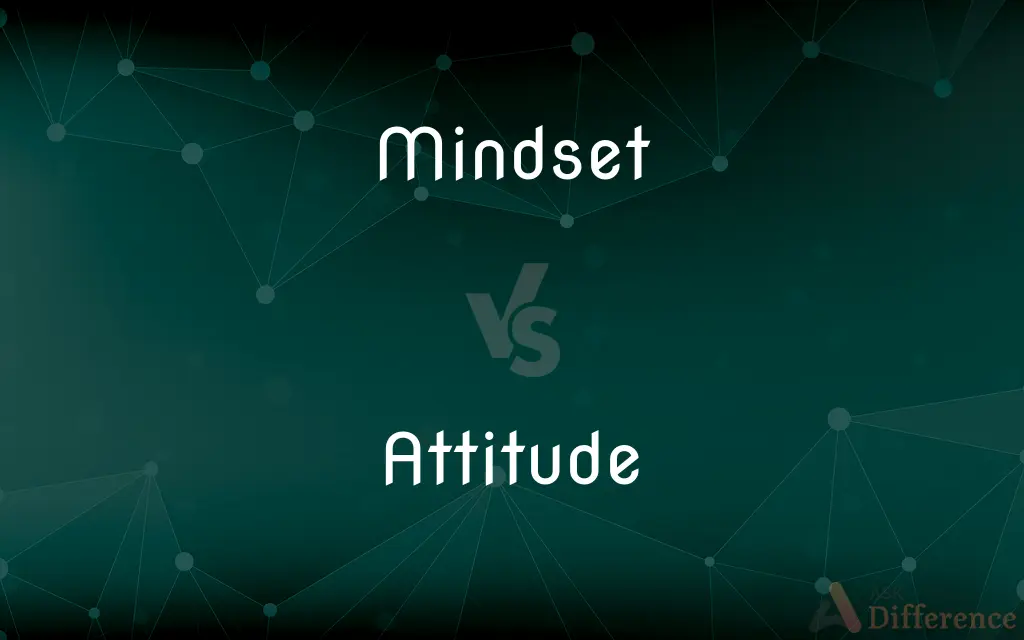Mindset vs. Attitude — What's the Difference?
By Tayyaba Rehman & Fiza Rafique — Updated on April 1, 2024
Mindset refers to a person's way of thinking and their beliefs, shaping how they view the world, while attitude denotes one's feelings or opinions about something or someone, influencing their behavior.

Difference Between Mindset and Attitude
Table of Contents
ADVERTISEMENT
Key Differences
Mindset embodies the collection of beliefs and thoughts that fundamentally shape an individual's perception of themselves and the world around them. It influences long-term behavior and decision-making processes, often being seen as a stable trait that can determine one's approach to challenges and learning. In contrast, attitude is more about one's immediate feelings or opinions towards specific subjects, people, or situations, and can be more fluid, changing with new experiences or information.
A growth mindset, for instance, is the belief that abilities and intelligence can be developed through dedication and hard work. This core belief affects overall behavior, fostering resilience and a love of learning. On the other hand, an attitude can be positive or negative towards specific aspects of life, like having a positive attitude towards teamwork, which encourages cooperation and collaboration in group settings.
Mindsets are foundational and can encompass various attitudes within them. For example, someone with an entrepreneurial mindset an overarching approach to seeing opportunities and being innovative can have varying attitudes towards risk, failure, or competition at any given moment. These attitudes may shift based on circumstances, whereas the underlying mindset remains constant, driving persistence and adaptability.
Attitudes are also directly linked to one's emotions and can significantly influence interpersonal relationships and day-to-day interactions. For example, a person may exhibit a cheerful attitude, which makes others more inclined to interact with them positively. In contrast, a mindset might not be as immediately evident in casual interactions but informs the deeper motivations and behaviors of an individual.
The development of mindset and attitude also differs; mindsets are often developed over a longer period and can be influenced by one's upbringing, culture, and personal experiences. They are deeply ingrained and sometimes challenging to change. Attitudes, however, can be more easily influenced and altered by immediate experiences, persuasion, and reflection, making them more dynamic and situational.
ADVERTISEMENT
Comparison Chart
Definition
A collection of beliefs that shape one’s way of thinking and outlook on life.
Immediate feelings or opinions towards something or someone.
Influence on Behavior
Influences long-term behavior and decision-making.
Affects immediate reactions and behaviors in specific situations.
Stability
Generally more stable, defining one's approach to life and challenges.
More fluid, can change with new experiences or information.
Example
Growth mindset vs. fixed mindset.
Positive attitude towards change vs. negative attitude towards change.
Impact
Determines approach to learning and challenges.
Influences day-to-day interactions and responses to specific circumstances.
Compare with Definitions
Mindset
The beliefs that influence one’s behavior and outlook.
With an entrepreneurial mindset, he always looks for innovative solutions.
Attitude
A settled way of thinking or feeling about something.
His positive attitude towards work contributes to his success.
Mindset
The cognitive frameworks that shape our understanding of the world.
A positive mindset often leads to better health outcomes.
Attitude
An expression of favor or disfavor towards a person or thing.
She has a negative attitude towards fast food.
Mindset
An individual’s enduring way of thinking.
Her growth mindset led her to view challenges as opportunities to improve.
Attitude
A reflection of one's feelings through behavior.
His cheerful attitude brightens up the office.
Mindset
A predisposition to approach situations in a particular way.
Her creative mindset helps her in finding unique perspectives.
Attitude
A stance or viewpoint regarding a particular issue.
Their attitude towards environmental conservation is very proactive.
Mindset
An attitude or set of opinions formed by beliefs.
His mindset on learning constantly evolves with experience.
Attitude
The inclination to act in a certain way due to an attitude.
Her helpful attitude makes her a great team player.
Mindset
In decision theory and general systems theory, a mindset is a set of assumptions, methods, or notions held by one or more people or groups of people. A mindset can also be seen as arising out of a person's world view or philosophy of life.A mindset may be so firmly established that it creates a powerful incentive within these people or groups to continue to adopt or accept prior behaviors, choices, or tools.
Attitude
A settled way of thinking or feeling about something
He was questioned on his attitude to South Africa
Being competitive is an attitude of mind
Mindset
A fixed mental attitude or disposition that predetermines a person's responses to and interpretations of situations.
Attitude
Truculent or uncooperative behaviour
I asked the waiter for a clean fork and all I got was attitude
Mindset
An inclination or a habit.
Attitude
The orientation of an aircraft or spacecraft, relative to the direction of travel.
Mindset
A way of thinking; an attitude or opinion, especially a habitual one.
Earth Day is a way of propagating and celebrating the environmentalist mindset.
Attitude
A manner of thinking, feeling, or behaving that reflects a state of mind or disposition
Has a positive attitude about work.
Kept a dignified attitude throughout the crisis.
Mindset
A habitual or characteristic mental attitude that determines how you will interpret and respond to situations
Attitude
Arrogant or aggressive disposition or behavior
One customer with a lot of attitude really tried my patience.
Attitude
A position of the body or manner of carrying oneself
Stood in a graceful attitude.
Attitude
A position similar to an arabesque in which a ballet dancer stands on one leg with the other raised either in front or in back and bent at the knee.
Attitude
The orientation of an aircraft's axes relative to a reference line or plane, such as the horizon.
Attitude
The orientation of a spacecraft relative to its direction of motion.
Attitude
The position of the body or way of carrying oneself.
The ballet dancer walked with a graceful attitude.
Attitude
(figurative) Disposition or state of mind.
Don't give me your negative attitude.
You've got a nice attitude today.
Attitude
Unpleasant behavior.
He doesn't take attitude from anybody.
I asked the waiter for a clean fork and all I got was attitude.
Attitude
The orientation of a vehicle or other object relative to the horizon, direction of motion, other objects, etc.
The airliner had to land with a nose-up attitude after the incident.
Attitude
(ballet) A position similar to arabesque, but with the raised leg bent at the knee.
Attitude
To assume or to place in a particular position or orientation; to pose.
Attitude
To express an attitude through one's posture, bearing, tone of voice, etc.
Attitude
The posture, action, or disposition of a figure or a statue.
Attitude
The posture or position of a person or an animal, or the manner in which the parts of his body are disposed; position assumed or studied to serve a purpose; as, a threatening attitude; an attitude of entreaty.
Attitude
Fig.: Position as indicating action, feeling, or mood; as, in times of trouble let a nation preserve a firm attitude; one's mental attitude in respect to religion.
The attitude of the country was rapidly changing.
'T is business of a painter in his choice of attitudes (posituræ) to foresee the effect and harmony of the lights and shadows.
Never to keep the body in the same posture half an hour at a time.
Attitude
A complex mental state involving beliefs and feelings and values and dispositions to act in certain ways;
He had the attitude that work was fun
Attitude
Position or arrangement of the body and its limbs;
He assumed an attitude of surrender
Attitude
A theatrical pose created for effect;
The actor struck just the right attitude
Attitude
Position of aircraft or spacecraft relative to a frame of reference (the horizon or direction of motion)
Common Curiosities
What determines a person's mindset?
A person’s mindset is determined by their core beliefs and thought patterns, often shaped by upbringing, culture, and personal experiences.
How does a growth mindset affect learning?
A growth mindset fosters the belief that intelligence and abilities can be developed through effort and perseverance, leading to a more resilient and open approach to learning.
How can attitudes change?
Attitudes can change with new experiences, information, or persuasion, reflecting their more immediate and situational nature.
Is it easier to change a mindset or an attitude?
It is generally easier to change an attitude than a mindset, as attitudes are more influenced by immediate experiences while mindsets are deeply ingrained.
How do mindsets and attitudes affect success?
Both mindsets and attitudes significantly affect success; mindsets by shaping perseverance and resilience in the face of challenges, and attitudes by influencing daily behaviors and interactions.
What impact do mindsets have on personal relationships?
Mindsets impact personal relationships by determining how individuals approach and respond to conflicts, communication, and emotional intimacy.
What role does attitude play in teamwork?
Attitude plays a crucial role in teamwork by influencing how individuals interact with each other, cooperate, and address challenges collectively.
Are mindsets culturally influenced?
Yes, mindsets can be influenced by cultural values and norms, which shape beliefs about self, success, relationships, and approaches to challenges.
Can organizations have a collective mindset?
Organizations can develop a collective mindset, often reflected in their culture, values, and approaches to innovation and challenges.
What is the relationship between mindset and motivation?
Mindset influences motivation by determining how individuals perceive their abilities and the value of effort, impacting their willingness to pursue goals.
Can someone's attitude contradict their mindset?
While attitudes can vary and sometimes appear to contradict one's overarching mindset, they typically align with the broader beliefs and views that constitute the mindset.
Can a positive attitude improve health?
Yes, a positive attitude can improve mental and physical health by reducing stress and encouraging behaviors that contribute to well-being.
How does attitude affect communication?
Attitude affects communication by influencing tone, openness, and the ability to empathetically connect with others, thereby impacting the effectiveness of the interaction.
How can understanding one's mindset and attitudes benefit personal growth?
Understanding one's mindset and attitudes can lead to self-awareness, enabling individuals to make conscious changes that align with their goals and improve their interactions with others.
Can educational systems influence students' mindsets?
Educational systems can significantly influence students' mindsets through teaching practices, feedback, and the overall learning environment, promoting either a growth or fixed mindset.
Share Your Discovery

Previous Comparison
Apricot vs. Nectarine
Next Comparison
Iva vs. BankruptcyAuthor Spotlight
Written by
Tayyaba RehmanTayyaba Rehman is a distinguished writer, currently serving as a primary contributor to askdifference.com. As a researcher in semantics and etymology, Tayyaba's passion for the complexity of languages and their distinctions has found a perfect home on the platform. Tayyaba delves into the intricacies of language, distinguishing between commonly confused words and phrases, thereby providing clarity for readers worldwide.
Co-written by
Fiza RafiqueFiza Rafique is a skilled content writer at AskDifference.com, where she meticulously refines and enhances written pieces. Drawing from her vast editorial expertise, Fiza ensures clarity, accuracy, and precision in every article. Passionate about language, she continually seeks to elevate the quality of content for readers worldwide.














































